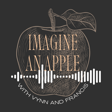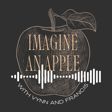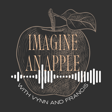
Everyday imagination with Ronja
What is the experience of imagining a gremlin on someone’s shoulder? How do people imagine music, sounds, time and emotion? How is imagination used to find keys and remember names?
Vynn and Francis chat with Ronja about her imagination, covering a wide range of topics that may inspire you to ask your own friends and family what happens in their minds.
As someone mostly aphantasic, Francis quizzes Ronja about how she imagines a gremlin on a friend’s shoulder. How solid is it? Does it rotate with the world? Is it alive, and to what extent is it under conscious control?
The conversations continues on the topics of imagining emotion, smell and music. Then it gets practical, discussing how imagination can be used to find things lost in your house, navigate to a destination and assemble furniture.
What are different ways people remember names, and what techniques can improve that? How do people imagine while watching movies and reading books, and what is it like to imagine emotions?
Timestamps:
00:48 Gremlin on your shoulder
04:27 Aliveness of the gremlin
05:43 Emotion, smell and sound
07:07 Imagining music
10:20 Sounds and memories
13:40 Harry Potter
15:10 Looking for keys
19:13 Phantasia coaching
21:27 Shape rotating
23:42 Navigation
28:02 Names and faces
34:14 Visualising time
39:15 Emotion, books, movies
46:16 Imagine an apple
Show Links:
- SET by PlayMonster - pattern matching card game
- Mind’s Eye Mentorship - formerly called AphantasiaMeow
- Mind’s Eye Courses - also by AphantasiaMeow
- Visualisations of calendars - Twitter thread
- Manar’s Twitter account - the gremlin was on his shoulder
Contact Details:
Please follow us, get in touch, tell us about your inner experiences!
Twitter: @imagine_apple @SurenVynn @frabcus
Email: imagine@flourish.org
Theme written, performed and recorded by @MJPiercello




